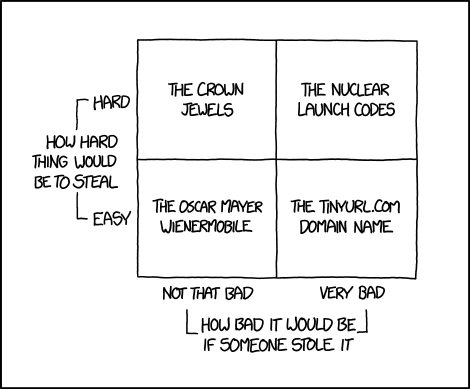Is it better for a bank/financial service to host this sort of short link to long link translation service on their own domain and infrastructure?
I think the question contains the answer. For me, the answer is a resounding yes.
A URL shortener should use a domain name that is owned and controlled by the 'bank'. The stakes are too high here.
In addition to the very complete answer by MechMK1, we have to keep in mind that any legitimate service, before it even goes out of business, can also get hacked (and quite likely, will be hacked), especially when it provides a springboard to a juicy target.
Consumers have been taught to be wary of phishing, and if the bank dismisses that advice by using an URL that clients are not familiar with, they will sow mistrust and confusion. You could even expect that a number of clients will report the mail as a possible spoof. Customer support is supposed to be busy enough and should not have to deal with self-inflicted problems.
To sum up, if they want a shortener it's probably not going to be as short as t.co, but could be short enough for the purpose (eg avoid line break in E-mail).
If they really insist they could buy a short domain name in .com or some country code extension, but that is still not a good idea. Because anybody can buy a domain name and fake whois data. The whois data in itself does not prove that the bank indeed owns and controls the domain name. The point is, you should have a coherent and somewhat predictable brand and naming strategy. That means, stick to the domain names that are already known and trusted by your client base.
Say there is a bank/financial service that wants to have hyperlinks on
their secure website/domain (or even in emails they send out to
customers). In some of these links there are some long/obscure URLs
which link to one of their subdomains, but the long links are ugly and
not very user friendly, so they want to have shorter, nicer links to
put on the website or email.
We have different use cases here. For websites, using descriptive URLs is something normal, and is usually for SEO reasons. If some URLs are too long, rewrite them or alias them. For example, try to have no more than 3 keywords in the URL and choose the most relevant. A shortener is not the answer here. But you can have subdomains.
For advertising, short names are indeed essential if consumers are going to type them. But they have to be memorable too. Shorter is not always better: www.thebank.com/invest is still more memorable than t.co/Ba21dQ22. But that's why we have QR codes: to relieve people from typing URLs.
In fact, if the 'bank' is already using subdomains, they could assign one just for redirects. And then add a short parameter in the query string like a number.
For E-mails, you don't want long URLs because they can be cut off by the line break. If you send HTML E-mail, that is not a problem really, because a long hyperlink can be embedded in a short keyword. The problem is text E-mail or E-mail clients that do not render HTML, and there are not so many nowadays.
So what kind of problem are you trying to solve ? My overall impression is that the shortener is mostly a marketing gadget, and that the right course of action is to improve what already exists. If you have ugly URls, take the time to review them, prettify them, shorten them. A short URL can be convenient but is not 'pretty'.

